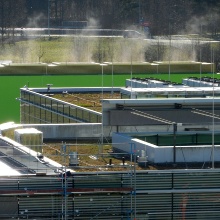Next to computer systems themselves, cooling systems account for the second largest consumer of electrical power in data centers. In a new project called DEGREE, initiated by the University of Stuttgart's Institute for Building Energetics, Thermotechnology and Energy Storage (IGTE) and the High-Performance Computing Center Stuttgart (HLRS), researchers will test a new approach for operating cooling systems in computing centers that could reduce energy demand, CO2 emissions, and operating costs.
"Data centers account for approximately 3% of all energy usage in Germany, and the amount is rising. Considering the substantial expenses and greenhouse gas emissions that result from the cooling of computing centers, innovation in the field of cooling technologies will be at least as important as innovation in information technology itself," said Dr. Henner Kerskes of the IGTE. "In our collaboration with HLRS, our goal is to develop reproducible methods and technologies that data centers everywhere could use to improve their energy performance."
The DEGREE project will test a new approach developed at IGTE that continually regulates the mixture of energy-efficient free cooling and more energy-intensive active cooling that is necessary to maintain an acceptable operating temperature. The goal is to achieve the most energy efficient cooling mix while simultaneously optimizing the performance of the computing system. DEGREE is supported by a two-year grant from the German Federal Environmental Foundation (Deutsche Bundesstiftung Umwelt, DBU).
Striking a balance between energy efficiency and computing performance
The most energy-efficient method for controlling temperature in data centers is called free cooling. Here, waste heat produced by computer servers is released directly into the atmosphere via cooling towers, avoiding the need to run energy-intensive compression or adsorption chillers. Free cooling only works, however, if the temperature of the heat released by the servers is greater than the outside temperature. In regions such as central Europe that experience wide temperature fluctuations, this means that the viability of free cooling can vary greatly.
To increase usage of free cooling, server systems today are often operated at higher temperatures. Unfortunately, though, this comes at a cost. Running server systems continuously at higher operating temperatures leads to higher power consumption in components such as semiconductor chips and can reduce their service life. Recent experiments in other supercomputing centers have also shown that a more nuanced approach to the use of free cooling could lead to better energy and performance gains.
In the DEGREE project, IGTE and HLRS intend to use a dynamic approach: The cooling temperature should never be higher than is absolutely necessary for free cooling. Researchers will develop a numerical model of the Hawk supercomputer and HLRS's cooling systems that considers temperature dependencies in all system components. The model will then be validated using real performance and operating data. The goal will be to understand the effects of dynamic regulation of the cooling circuit temperature on energy consumption, on the performance and reliability of IT components, and on savings in terms of financial costs and CO2 emissions. The team will then develop and test operating strategies for maximizing free cooling dynamically during Hawk's operation.
"The idea of continually optimizing the use of free cooling in data centers is a new approach that has not been tried before," said HLRS Director Prof.-Dr. Michael Resch. "We look forward to attempting this innovative experiment with our partners at the IGTE and hope that we can also help other data centers to improve energy efficiency in their operations."
Knowledge transfer to improve energy performance in commercial data centers
Partners from industry will also contribute to DEGREE to ensure that the results of the project are transferrable to commercial computing centers. These include ICT Facilities, a data center planning office, and T.P.I. Trippe und Partner, an engineering firm specializing in energy and building technologies. Information and telecommunications industry membership organization Bitkom will also support the project. At the conclusion of the project, the DEGREE team plans to produce a set of guidelines that companies anywhere could use to test and implement dynamic cooling regulation of their own data centers. The integration of these approaches holds the potential to support reductions in energy usage and CO2 emissions resulting from data center cooling across Germany.
Expert Contact:
Prof. Michael Resch, High-Performance Computing Center of the University of Stuttgart, Phone +49 (0)711 87200, E-Mail
Dr. Henner Kerskes, University of Stuttgart Institute for Building Energetics, Thermotechnology and Energy Storage, Phone +49 711 685- 63534, E-Mail


